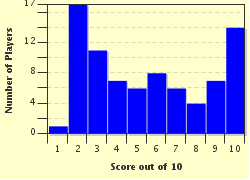Quiz Answer Key and Fun Facts
1. This Fool is never given a personal name and doesn't appear in the text after the third act of the play. Out on the heath with his master, he exclaims: "This cold night will turn us all to fools and madmen". And he should know! Maybe he gets lost in the storm. Whose fool is he - in which play does he appear?
2. This fool accompanies his master from Verona to Milan, but he's not happy about it. "I am but a fool, look you, and yet I have the wit to think my master is a kind of a knave." Some Shakespearian characters talk to themselves a lot onstage, but this guy addresses his soliloquy to his canine companion, Crab. What's this fool's name?
3. "How ill white hairs become a fool and jester!" The fool and jester in question is Falstaff, who appears in three of Shakespeare's plays, but who is speaking to him here, and in which play?
4. In Shakespeare's theatre, actors specialised in different kinds of role. Which pair of actors from among those listed on playbills of the time were renowned for playing the roles of clowns and fools?
5. Who denies being his mistress's fool, saying, "She will keep no fool, sir, till she be married, and fools are as like husbands as pilchards are to herrings: the husband's the bigger"?
6. In which play is the clowning provided by identical twin brothers? One says to the other at the end of the play, "Methinks you are my glass, and not my brother"; adding, "I see by you I am a sweet-faced youth"!
7. In some of Shakespeare's plays, the "fool" role is actually a professional jester, but in others, the character on whom the clowning focusses actually has a different profession. Which of the following is genuinely a jester? (You might like to test yourself on what the others actually do before you check the answer!)
8. In "The Winter's Tale", which of the following characters is identified as "Clown" in the Dramatis Personae? He is a simple fellow rather than a witty guy and in his first appearance in the play gives a garbled account of a shipwreck and a homicidal bear: "How the poor gentleman roared, and the bear mocked him, both roaring louder than the sea or weather."
9. "A shrewd knave and an unhappy", whose household does the Fool serve in "All's Well That Ends Well"?
10. This should be a relatively straightforward question ... strange as it may seem, Shakespeare's tragedies have their comedy moments too. In which of them is a pair of clowns employed as gravediggers, digging a grave "for no man"?
Source: Author
HobbitLady
This quiz was reviewed by FunTrivia editor
agony before going online.
Any errors found in FunTrivia content are routinely corrected through our feedback system.


